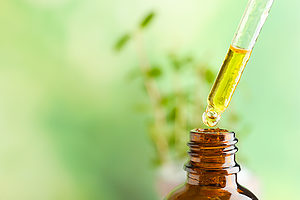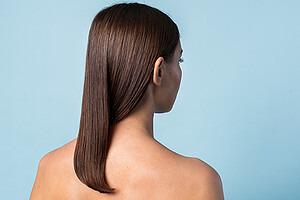Black seed oil is a natural oil withdrawn from a flowering plant’s seed native to North Africa, southern Europe, and Southeast Asia. (1) Black seed is also known as black cumin (Nigella sativa).
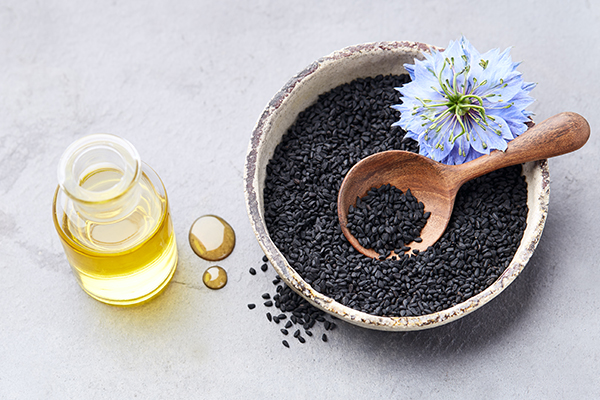
Black seed oil has been used traditionally in medicines and cooking due to its health benefits. (2) But did you know black seed oil can be good for the hair as well?
Black seed oil contains “whole” protein made with a combination of 8 of the 9 essential amino acids. It also contains vitamins B1, B2, and B3, iron, folic acid, calcium, phosphorous, zinc, and copper. (3)
Moreover, black seed oil possesses antifungal, antibacterial, antimicrobial, anti-inflammatory, and antioxidant properties and is rich in oleic, linoleic, thymoquinone, linolenic, palmitic, and palmitoleic acids.
Thus, it may be concluded that black seed oil is beneficial for the hair and supports hair health. (2)
Read further to learn how to achieve healthy, strong, and beautiful hair with black seed oil.
Article Contents
What Are the Benefits of Black Seed Oil for the Hair?
Black seed oil offers the following benefits.
1. Promotes hair growth
Black seed oil has become popular as it promotes hair growth.
A 2016 research reported that it contains a powerful anti-inflammatory and antioxidant compound known as thymoquinone. This compound keeps inflammation and damage away from the hair follicles. With antifungal and antimicrobial properties, it also clears out dandruff and scalp infections that cause hair loss. (4)
Moreover, a 2021 research reported that black seed oil helps regrow hair in the regions of the scalp that are prone to thinning. It encourages hair growth and has been used for centuries to treat hair loss. (5)(6)(7)
2. Moisturizes dry hair
According to a 2021 study, the high amounts of fatty amino acids and antioxidants in black seed oil seal the moisture in the hair shaft and moisturize the scalp and hair. (7)(5) The hair shaft is the visible part of the hair that sticks out of the skin.
Thus, black seed oil is great for hair moisturization
3. Improves scalp health
Black seed oil has antiviral, antifungal, anti-inflammatory, and analgesic (pain-killing) properties. These properties maintain scalp health. (8)
It palliates several skin conditions such as eczema (a skin condition that makes your skin itchy, dry, and bumpy) and psoriasis (a condition that causes scaly patches and itch). (5) It balances the oil production on the scalp and keeps it well moisturized.
4. Helps treat dandruff
A 2021 research reported that black seed oil helps treat dandruff. (5) Thus, it can be used in antidandruff shampoo. (6)
5. Reverses hair damage
The hair undergoes a lot of stress every day. Free radicals from external factors such as sun damage, pollution, dirt, and other contaminants can leave your hair lifeless, dull, and damaged.
You don’t need expensive hair care treatments to minimize the damage caused by these free radicals. Instead, you can massage your scalp and hair with black seed oil regularly.
The abundant antioxidants (9) in black seed oil neutralize the effects of free radicals and prevent hair damage. Its nourishing properties can make your hair lustrous and super healthy by reversing the damage.
6. Prevents premature graying
In some cases, black seed oil didn’t just prevent premature graying; it reversed the graying. The reason behind this effect is the high amounts of linoleic acid in black seed oil, (10) which prevents black pigment cell reduction in the hair follicles. This property will give you shiny and black hair for a long time.
How to Use Black Seed Oil on Hair
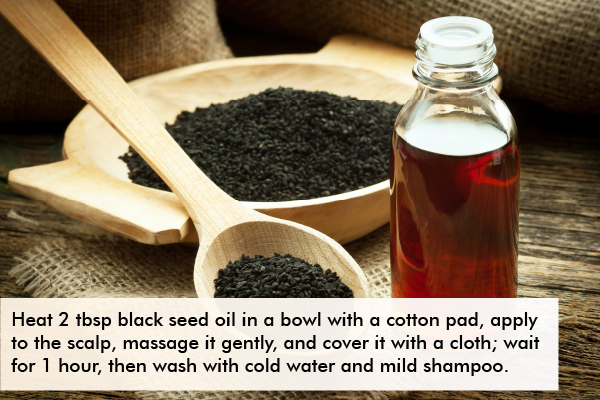
You can use black seed oil in the following ways to address hair issues and promote hair health.
Black seed oil to limit hair fall
- Heat 2 tbsp of black seed oil.
- Using a cotton pad, apply the warm oil to your scalp.
- Massage your scalp gently for 5 minutes and cover it with a cloth.
- Let it sit for an hour.
- Wash your hair with cold water and a mild shampoo.
- For best results, repeat this process twice a week.
Black seed oil and coconut oil to treat dry hair
- Mix equal amounts of black seed oil and coconut oil in a bowl according to your hair length and volume.
- Warm the mixture for a few seconds to facilitate proper mixing.
- Part your hair in sections and apply this mixture to your scalp.
- Massage your scalp for 10–15 minutes and let it rest for about ½ hour.
- Rinse your hair with a regular mild shampoo and a conditioner.
- Apply it thrice a week to get smooth, frizz-free hair.
Black seed oil and castor oil for hair growth
- Mix 2 tbsp of black seed oil and 1 tbsp of castor oil.
- Heat the mixture to thin out the oil’s consistency.
- Massage your scalp with this oil blend. Focus on areas that are susceptible to balding, such as the temples.
- Let it sit on your scalp for 1 hour.
- Rinse it off with cold water and a mild shampoo.
- Repeat this process at least once a month for excellent results.
Black seed oil and lemon to prevent premature hair graying
- In a bowl, mix the juice of one lemon and 2 tbsp of black seed oil.
- Apply this mixture to your scalp.
- Let it sit for ½ hour.
- Wash your hair and pat it dry.
- Apply black seed oil.
Tips for Applying Black Seed Oil
Keep the following tips in mind when putting black seed oil in your hair.
- The best time to use black seed oil is at night. Applying it during the day can make your hair appear oily.
- Add a few drops of black seed oil to your conditioner if you have fine hair, and see the benefits yourself.
- If your hair is coarse and thick, apply a bit more oil on your hair, but not too much, as it can make your hair oily.
- Instead of hair serums, you can apply black seed oil to your damp hair.
Side Effects and Precautions When Using Black Seed Oil on Hair
Black seed oil is well tolerated by a lot of people and is generally safe when used topically and in moderation. However, some people may experience complications or side effects, such as:
- Allergic reaction: Black seed oil or its components, such as thymoquinone, can cause allergies in some people. Itching, redness, rash, swelling, difficulty breathing, or hives are some of the signs and symptoms of an allergic reaction. Seek immediate medical attention if you experience any of these signs or symptoms.
- Scalp irritation: Black seed oil may not be a good option for people with a sensitive scalp as it may react negatively. It may lead to contact dermatitis and cause itching, blotching, and rashes on the skin. (11) Discontinue its usage or reduce its amount if there are any noticeable signs.
- Drug interaction: Some medications may react with black seed oil or its components, such as diabetes drugs, blood thinners, or blood pressure drugs. The drug interaction can lead to hypotension, hypoglycemia, or bleeding. Thus, before using black seed oil on your hair and scalp, consult your doctor.
General Queries
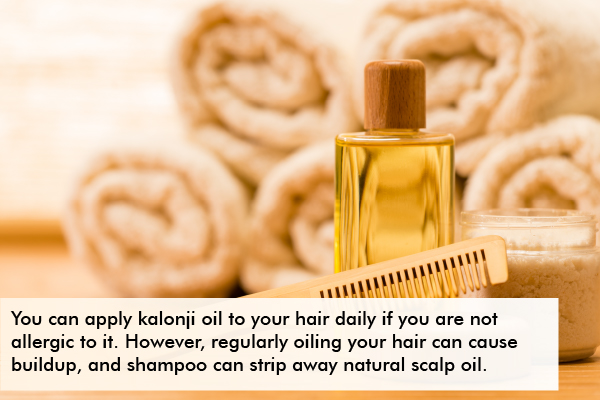
Can I apply black seed oil to my hair daily?
Yes, you can apply black seed oil to your hair daily if you are not allergic to it. However, oiling your hair regularly can cause buildup, and applying shampoo regularly can strip away the natural scalp oil.
Thus, it is advised to use black seed oil two to three times a week only for best results.
How often can I use black seed oil on my hair?
You can use black seed oil twice a day for optimum results. Massage your scalp thoroughly with this oil to stimulate blood circulation in the hair follicles and boost hair growth.
Can I leave black seed oil in my hair overnight?
Yes, you can leave black seed oil in your hair overnight. With its hair-friendly nutrients, it nourishes the scalp, stimulates the hair follicles, and improves hair growth.
Final Word
Black seed oil moisturizes dry hair, improves scalp health, reverses hair damage, prevents premature graying, boosts hair growth, and provides several other benefits.
However, keep in mind that there are possible side effects of using black seed oil on the hair and certain precautions must be observed when using it. It can also cause allergic reactions such as hair color change, scalp irritation, and drug interactions.
Therefore, use black seed oil correctly and in moderation to enjoy all its benefits on your scalp and hair.
References
- International Journal of Research and Review. https://www.ijrrjournal.com/IJRR_Vol.8_Issue.4_April2021/IJRR041.pdf.
- Yimer EM, Tuem KB, Karim A, Ur-Rehman N, Anwar F. nigella sativa L. (black cumin): A promising natural remedy for wide range of illnesses. Evidence-based complementary and alternative medicine: eCAM. https://www.ncbi.nlm.nih.gov/pmc/articles/PMC6535880/. Published May 12, 2019.
- Albakry Z, Karrar E, Ahmed IAM, et al. Nutritional composition and volatile compounds of black cumin (Nigella sativa L.) seed, fatty acid composition and tocopherols, polyphenols, and antioxidant activity of its essential oil. MDPI. https://www.mdpi.com/2311-7524/8/7/575. Published June 24, 2022.
- Nigella sativa seed, a novel Beauty Care Ingredient: A Review. https://www.researchgate.net/publication/315474605/.
- The Open Dermatology Journal. https://opendermatologyjournal.com/contents/volumes/V15/TODJ-15-52/TODJ-15-52.pdf.
- Nigella sativa seed: A cosmetic herb – ijcrt.org. https://ijcrt.org/papers/IJCRT2104548.pdf.
- A bucolic remedy of formulation and evaluation of Polyherbal Hair Oil. https://www.researchgate.net/publication/356962868/.
- Mahboubi M. Natural therapeutic approach of nigella sativa (black seed) fixed oil in management of Sinusitis. Integrative medicine research. https://www.ncbi.nlm.nih.gov/pmc/articles/PMC5884000/. Published March 2018.
- Yimer EM, Tuem KB, Karim A, Ur-Rehman N, Anwar F. nigella sativa L. (black cumin): A promising natural remedy for wide range of illnesses. Evidence-based complementary and alternative medicine: eCAM. https://www.ncbi.nlm.nih.gov/pmc/articles/PMC6535880/. Published May 12, 2019.
- Amin S; Mir SR; Kohli K; Ali B; Ali M; A study of the chemical composition of black cumin oil and its effect on penetration enhancement from transdermal formulations. Natural product research. https://pubmed.ncbi.nlm.nih.gov/20582810/.
- Black Seed. National Center for Biotechnology Information. https://pubmed.ncbi.nlm.nih.gov/30000936/.




